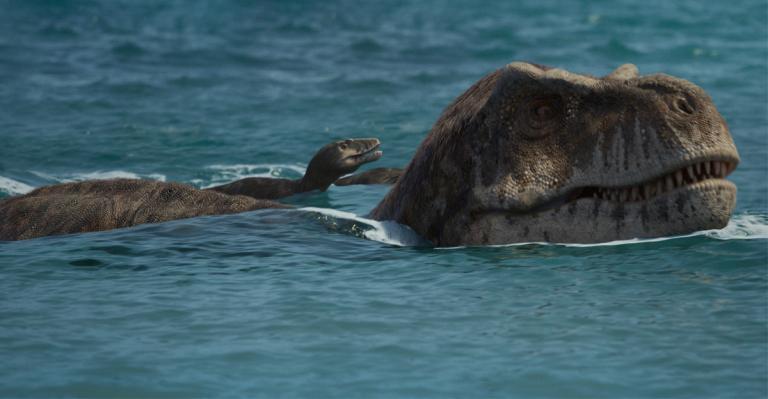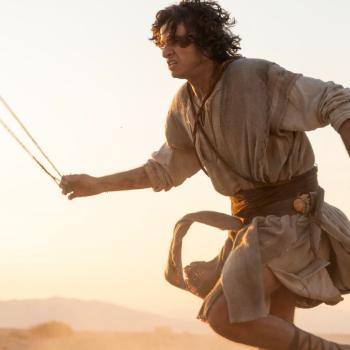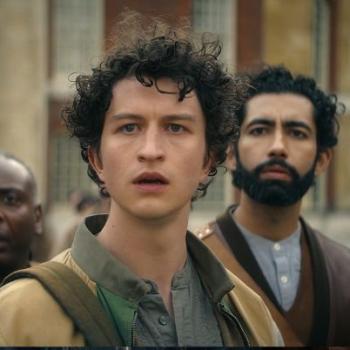In the new AppleTV+ series “Prehistoric Planet,” which premiered this week, the natural habitat of dinosaurs is imagined using state-of-the-art computer graphics, pristine cinematography, and a stellar team of producers including Jon Favreau and Mike Gunton, and BBC Studios Natural History Unit (“Planet Earth”). The series is narrated by Sir David Attenborough and the score is provided by Academy Award-winning composer Hans Zimmer.

“Prehistoric Planet” imagines the unseen world of the dinosaurs in a variety of natural habitats, including coasts, deserts, freshwater, ice worlds, and forest.
During a recent conference call with Favreau, Gunton, Darren Nash, paleontologist, and showrunner Tim Walker, talked about the inspiration for the series, and why dinosaurs continue to fascinate viewers of all ages.
What inspired you to make this series? And what was your biggest goal with it?
Gunton: Well, I think the inspiration started actually about 10 years ago. It’s had kind of two phases. The initial inspiration actually was standing on a mountainside in Africa with Sir David Attenborough. And he was introducing a series we were making called About Africa. And he said “Nowhere on earth does wildlife put on a greater show.” Those were his lines. And I sat there thinking, “I wonder if that’s always been true. I wonder if there was a time when that was not the case. When would the most extraordinary time have been?” And I reckoned, the time of the dinosaurs, when they were walking across that mountain, that would have been the most extraordinary time when wildlife put on its greatest show. So, I thought, “Could you get everybody standing on that mountainside including Sir David, the crew, all the directors, all the experts, all the camera kit, stick it in a time machine, go back to the time of the dinosaurs, and make a wildlife film that showed them doing that?” And that was bubbling away in my mind for a number of years.
And then, about four years ago, it started to all come together. We all met. And I met Jon in Jay Hunt’s office in Apple. And we started talking about lions actually. And obviously, it was a kind of meeting of minds. And we thought then actually now we can build that time machine. We now can get everybody in that machine and go and do the show. And that’s what we’ve done. That’s “Prehistoric Planet.”
What was the biggest surprise you learned during the actual making of this project, something that blew you away, something that you had never considered in all these years leading up to this moment?
Favreau: You know, remember we’re coming from two different worlds, this team. This team, other than me, they have worked on all of those “Planet Earth” documentaries, all of these really rich scientific, entertaining, long-from cinematic, new-style of documentary that was such an inspiration for the team that I’ve been working with. We’re more of the CGI tech team. When we were working on “The Lion King” and “The Jungle book,” we were looking at these documentaries and trying to emulate what they were able to do. So, there was a big learning curve where the group of people I’ve worked with had to learn how documentaries are made. And the documentary teams had to learn how to use technology to help create the magic trick of making it seem like it was happening and unfolding before your eyes. So, I would say I probably learned the most because I had no background in any of this. And so it’s been about two or three years. And the gentleman sitting over there, Darren Naish, he’s a paleontologist. And he’s been on all the calls with us. And so, between Tim and Mike and Darren and then we would have, you know, remote teams from all over the world on all calls, and I got to learn a lot about, not just about dinosaurs, but about biomes, about the way that the world developed.
Part of what made this such a fun project for me is I got to get a front-row seat to the state-of-the-art technology as it related to the cinematic approach, to how we shot the plates but also a front-row seat for the latest paleontological… Am I saying that right? …Paleontological research. Because I didn’t realize this. But we’re living in a golden age of dinosaurs where there’s new discoveries made on a monthly basis. And each one of those discoveries cascades down throughout our understanding of what the ancient world was like and how life developed on this planet. So, to me, I’m very grateful for the rich education I was able to get from the leaders of these fields.
What is it about dinosaurs that keeps kids and adults coming back for more?
Nash: I have one take on this, having considered this at length, the various books I’ve done, I’ve written various kid’s books about it and spoken to, you know, people of all ages including kids a lot, there’s something that’s been missed about dinosaurs. And it’s not that we just like them because they’re, you know, like symbolic monsters or they remind us of dragons. They are super animals. They’re off the charts. Now it’s absolutely normal for people throughout the whole of history, all cultures, people are enamored by animals. We’re obsessed with animals. We adore big cats and sharks and the great whales, and, you know, all these other amazing animals. And, you know, if you know anything about the natural world, you’ll be part of this club. You know, we adore animals. I think inherently people get this about dinosaurs. They get the idea that, wow, a big crocodile or a lion is a spectacular animal. But now compare it to Tyrannosaurus rex, which is a hundred times bigger. And has a skull the size of a person. An animal that its jaw muscles alone would weigh as much as a person. These animals are just off the charts. And I think, you know, kids often instinctively get that. They don’t have to be staring at a skeleton in a museum. Just reconstructions and toys depict this as well. I just think we inherently get the fact that they’re just off the charts. They’re super animals. They’re amazing.
Favreu: I respectfully have an alternative take on it based on my background. Again, I haven’t been dealing with dinosaurs, except with this group here and Darren has a very deep understanding of it. But as a storyteller, I go to the monomyth and the mythological aspects of it. There are certain things when you’re designing creatures from scratch, even, that everybody continues to be drawn to. And I think just as you could take a cat that’s never seen another animal, and you could put it in a room with a mouse, it reacts in a certain way. And I think that our firmware has a deep, deep, deep understanding of predators that date back to when we were, you know, first standing upright in the fields. And the animals that we had to understand were predators, and it was baked deeply into us to be afraid of. And it tends to be grouped into certain categories like birds and eagles or snakes or bears. Things we teeth. Things with claws. Predators. Apex predators that, you know, we were not apex predators when we evolved. And we have still inherited that hardware. You know, we just happened to develop larger brains and happened to really cooperate well. But other than that cooperation, we don’t really stand a chance against most creatures out there. And so our nightmares are built to the of the same things that build our stories and the same thing that makes Stan Winston or Guillermo del Toro develop new fantasy creatures. But they all seem to have those qualities that medieval dragons might. Or griffons. They’re a mixture of snakes and bears and eagles. And they’re big. And they can kill us. And I think that deep down, when you see a dinosaur for the first time as a child, and you see what it is and you see those teeth and you see that T-Rex in the museum, and you look up at it, it hits something deep in you. Just for the same reason we’re fascinated with lions and the big cats. Because it’s baked into us. And all of the stories that have developed over the years, this all pre-dates. And so that’s why you see, you know, in the Arthurian stories, they’re going after, you know, or medieval mythologies there, it’s slaying the dragon. It’s the serpent. And these are serpents, these are the perfect combinations of a kid bashing super-monster that would inhabit your nightmares. And so you become fascinated with them. So I think that that’s why people jump to them immediately. And then the sense that these may have really existed and what would it be like if you found yourself in proximity with them. I think it’s fascinating.
Gunton: Can I just add one anecdote that might just join both of those together? Just to finish off with my contribution, is that we talked about ages and how it appeals to people who are young and old. So Sir David Attenborough was 96 last week. Last weekend. And, well, I told him we were going to do this project ages ago. He said, “My God, this sounds amazing. I can’t wait to see. This is gonna be incredible.” Partly for the reasons both Jon and Darren said. But then when we finally showed him the stuff, and he was sitting in the dubbing theater in the recording booth with his headphones on recording the commentary for the second episode, actually, and there’s a scene where two T-Rex are nuzzling each other in this sort of courtship display. And, you know, at the end of it, he takes his headphones off, his glasses are all square from this, sort of peering out of this. We’re doing so he says, “Mike, it was as if I was there looking at them through a pair of binoculars. It was absolutely incredible. When can I see the next ones?” I think for David to say that who has seen everything, I mean, he’s the most traveled, most experienced, and altruistic filmmaker, knowledgeable person in the world, for him to say that we all said, “I think we’re doing okay.”
“Prehistoric Planet,” produced by BBC Studios with executive producers Jon Favreau and Mike Gunton, is now streaming on AppleTV+.













